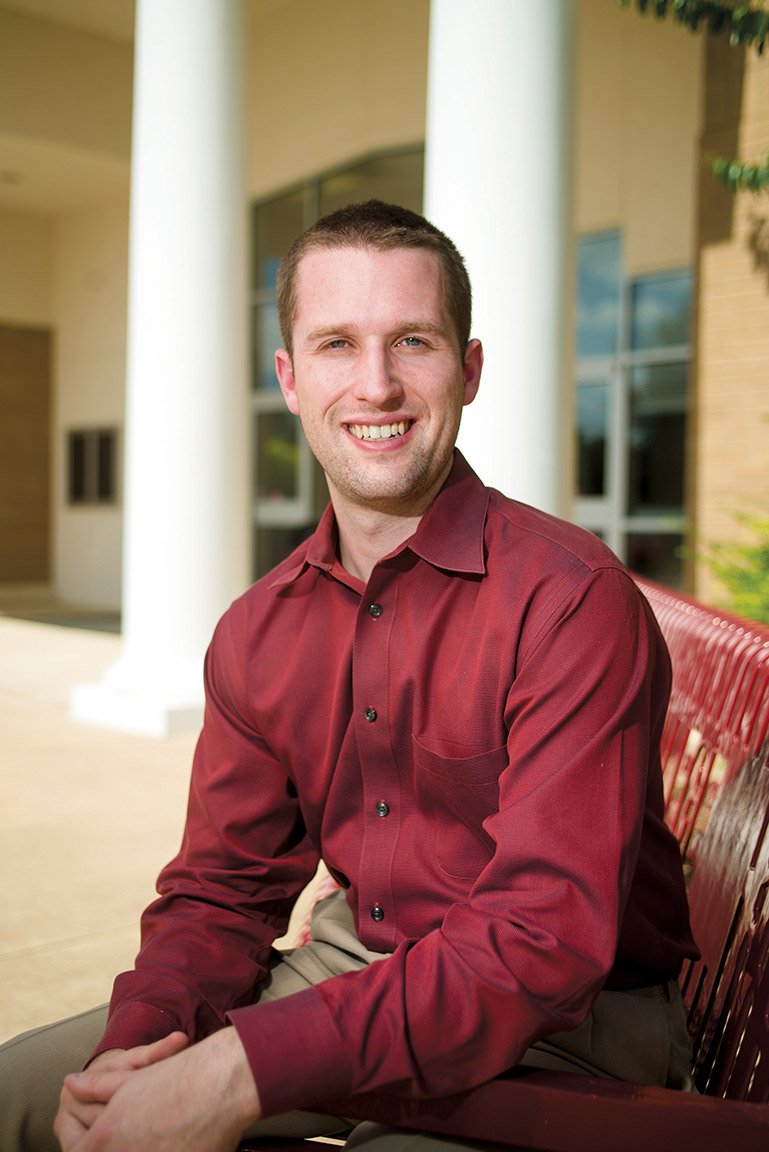Many people know at a young age what they want to do for the rest of their lives, but sometimes life throws a curveball, and those plans need to change. That curveball came early for Nick Wilcox, and now he works to make sure other people are prepared with the education they need in case their strategy goes awry.
Wilcox is the new program coordinator and instructor for the criminal justice program at Ozarka College. He grew up in San Jose, California, and since he can remember, he wanted to be either a police officer or a pilot. When he was 14 years old, he did a police ride-along as part of his civics class, and the experience solidified his earlier dreams of being a police officer.
“I kind of got bit by the bug and thought it was really cool,” he said. “When I was on the ride-along, I found out you could do this thing called police cadets, where you wear a uniform and come out to help with events and volunteer in the community. I applied and got into that, and it just kept going from there.”
Wilcox started in the police cadets program when he was 15, participating in toy drives and volunteering at parades. When he graduated from high school, he went to San Jose State University to study criminal justice, but the draw to be a full-fledged officer was too great, and he left school early in pursuit of his career.
“I decided that I couldn’t wait any longer, and I applied and went through the police academy,” he said.
Following his time at the academy, Wilcox was hired by the Los Altos Police Department, where he had served as a police cadet. He worked as an officer for four years before a car accident he was involved in while on duty brought him to an early medical retirement. He was 24 years old and had to figure out a backup plan, which he said he never felt the need to consider until then.
“I thought I was going to make a whole 30-year career out of [law enforcement], and then that happened,” he said. “Then I realized I better go back to school and figure out what to do next. It was very hard to let that career go.
Everything I pictured about myself was in police work. To have that gone, I had to figure out who I was again.”
Wilcox said he knew he wanted to stay in criminal justice, and he knew that meant going back to school. He went to Gavilan College in Gilroy, California, for two years, and during that time he started thinking about becoming a criminal justice professor.
After the accident that took him off the force, Wilcox said, he went through several surgeries and physical therapy. Some of that medical aftermath took him to Virginia, where he met his wife and finished his bachelor’s and master’s degrees. He is now pursuing a doctorate online.
After earning his master’s degree, Wilcox taught criminal justice at Fletcher Technical Community College in Louisiana, and he said his personal history contributed to his success there.
“I have been to college straight out of high school, so I know what that’s like,” he said. “I know what it’s like to return to college with experience in the field while having a family and life obligations along with it, to be what we call a nontraditional student. I think that gives me a variety of perspectives.”
Wilcox said that at his job in Louisiana, he also saw the advantage of having book knowledge coupled with his on-the-job experience and how that combination helped him teach his students.
“We’re reading, and this stuff is theory, but I also have the practical side,” he said. To have an instructor that has the education, as well as the practical experience, will be unique for our students, especially those who are already working in the field.”
The other instructors in the criminal justice program at Ozarka College also have applicable experience, Wilcox said, and students can benefit from being taught by a deputy, a former officer, a paralegal and other people in the field.
Ozarka College offers an Associate of Science degree in criminal justice and corrections, a certificate of proficiency in corrections and criminal justice, and a certificate of proficiency in forensics.
Additionally, the two-year college recently signed an agreement with the University of Arkansas-Fort Smith that will help students earn a Bachelor of Science in Criminal Justice degree after earning an associate degree at Ozarka. The agreement assures a seamless transition between the two degree programs, and the bachelor’s degree can be earned entirely online, making the program convenient for working professionals.
Wilcox will be based out of Ozarka’s Ash Flat campus. For more information about the college and available programs, visit www.ozarka.edu.
Staff writer Angela Spencer can be reached at (501) 244-4307 or aspencer@arkansasonline.com.
